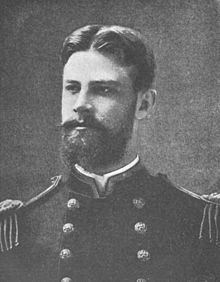Richmond Pearson Hobson
| Richmond P. Hobson | |
|---|---|
 |
|
| Member of the U.S. House of Representatives from Alabama's 6th district |
|
|
In office March 4, 1907 – March 3, 1915 |
|
| Preceded by | John H. Bankhead |
| Succeeded by | William B. Oliver |
| Personal details | |
| Born |
Richmond Pearson Hobson August 17, 1870 Greensboro, Alabama U.S. |
| Died | March 16, 1937 (aged 66) New York, New York, U.S. |
| Political party | Democratic |
| Alma mater | U.S. Naval Academy |
| Awards | Medal of Honor |
| Military service | |
| Allegiance |
|
| Service/branch | United States Navy |
| Years of service | 1889–1903 |
| Rank | Rear Admiral |
| Battles/wars |
Spanish–American War *Sinking of the Merrimac |
Richmond Pearson Hobson (August 17, 1870 – March 16, 1937) was a United States Navy Rear Admiral who served from 1907–1915 as a U.S. Representative from Alabama. A veteran of the Spanish–American War, he received the Medal of Honor years later for his part in that conflict.
He was born at Magnolia Grove in Greensboro in Hale County in the western Black Belt of Alabama. He was the son of Sarah Pearson and James M Hobson. He was the nephew of Richmond Pearson (1852–1923) and the grandson of Justice Richmond Mumford Pearson (1805–1878). He graduated from the U.S. Naval Academy in 1889. He was ostracized by his fellow midshipmen for his total abstinence from alcohol and tobacco. He maintained a superb academic record, graduating first in his class and became the highest ranking midshipman: Cadet Battalion Commander (today's Brigade Commander). After duty in Chicago, he underwent additional training and was appointed Assistant Naval Constructor in 1891. Hobson then served at various Navy Yards and facilities, including a tour of duty as instructor at the Naval Academy.
In the early days of Spanish–American War, he was with Admiral William T. Sampson in New York, and arrived off Santiago on June 1, 1898. In order to bottle up the Spanish squadron of Admiral Pascual Cervera y Topete, Hobson took temporary command of the collier Merrimac, which he would attempt to sink as an obstruction in the channel. The attempt was made early June 3, under heavy Spanish fire, which disabled the steering gear of the collier. Hobson did sink the Merrimac, but was unable to place her in the shallowest part of the channel. With his crew of six, he was picked up by Admiral Cervera himself and treated quite chivalrously.
...
Wikipedia
